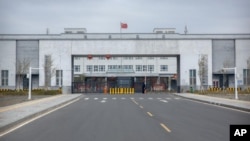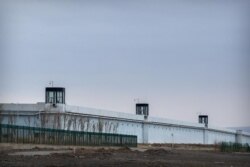More than 170 Chinese Communist Party, government, military, paramilitary and hybrid administrative entities in China have participated in building and maintaining repressive governance of Uyghurs and other indigenous groups in Xinjiang since 2014, according to a report released this week.
The Australian Strategic Policy Institute, an Australia- and U.S.-funded research group, said Tuesday in its latest Xinjiang report that after analyzing thousands of pages of Chinese-language sources, “including leaked police records and government budget documents never before published,” it gained insights into the methods used by the CCP to oppress Uyghurs and other indigenous communities in Xinjiang.
According to the 82 pages of research, top-down administrative entities from Beijing to Xinjiang — such as the Central Committee of the Chinese Communist Party led by President Xi Jinping in Beijing, to Xinjiang’s neighborhood subdistrict committees responsible for local party control — have operationalized governance techniques and bureaucratic structures with recent campaigns against the Uyghurs in Xinjiang.
“The crackdown against the Uyghurs has a striking resemblance to Mao-era political campaigns,” the report said. “[I]n addition to mass internment and coercive labor assignments, Xinjiang residents are also compelled to participate in acts of political theatre, such as mass show trials, public denunciation sessions, loyalty pledges, sermon-like ‘propaganda lectures,’ and chants for Xi Jinping’s good health.”
In doing so, they’re mobilized to attack shadowy enemies hiding among the people: the so-called “three evil forces” and “two-faced people,” the report added.
Beijing says the “three evil forces” are terrorists, separatists and religious extremists among Uyghurs and other indigenous people in Xinjiang and “two-faced people” are officials who are not loyal to the Chinese Communist Party.
The report says that Beijing’s top-down response to the “perceived radicalization of Uyghur society and a systematic effort to transform Xinjiang and its indigenous inhabitants” are found in the Counterterrorism Campaign and the Re-education Campaign in Xinjiang from 2014 to 2021.
‘Hegemony at the grassroots’
The policies Beijing has implemented during the crackdown on the Uyghurs, according to the report, gave Xinjiang’s neighborhood and village officials exceptional power to police residents’ movements and even their emotions, including triggering police action when a Uyghur teenager’s social media posts about finding life hopeless were deemed a threat to stability.
“Xinjiang’s community-based control mechanisms are part of a national push to enhance grassroots governance, which seeks to mobilize the masses to help stamp out dissent and instability and to increase the party’s domination in the lowest reaches of society,” the report said.
Report ‘fabricated’
On Tuesday, Chinese foreign ministry spokesperson Wang Wenbin called ASPI’s report “fabricated” and “slanderous” rhetoric.
“This discredited body lacks basic factual basis and runs against the professional ethics of academic research,” Wang said. “The reports it fabricated, including those lies of ‘forced labor,’ are nothing but slanderous rhetoric without any credibility.”
On Thursday, 43 countries at United Nations called on China to grant the U.N. high commissioner for human rights access to Xinjiang, citing concern about human rights violations among Uyghurs and other Turkic Muslims in the Xinjiang Uyghur Autonomous Region in northwest China.
"There are generalized and systematic violations of human rights, torture, forced sterilization, sexual violence and forced separation of children," France's U.N. Ambassador Nicolas de Rivière said on behalf of the 43 concerned countries.
China's U.N. ambassador, Zhang Jun, dismissed the criticism as "groundless.”
"To the U.S. and a few other countries, let me say this: Your trite lies are totally unfounded," Zhang said. "Xinjiang enjoys stability, development and prosperity, and the Chinese people's life is getting better day by day.”





